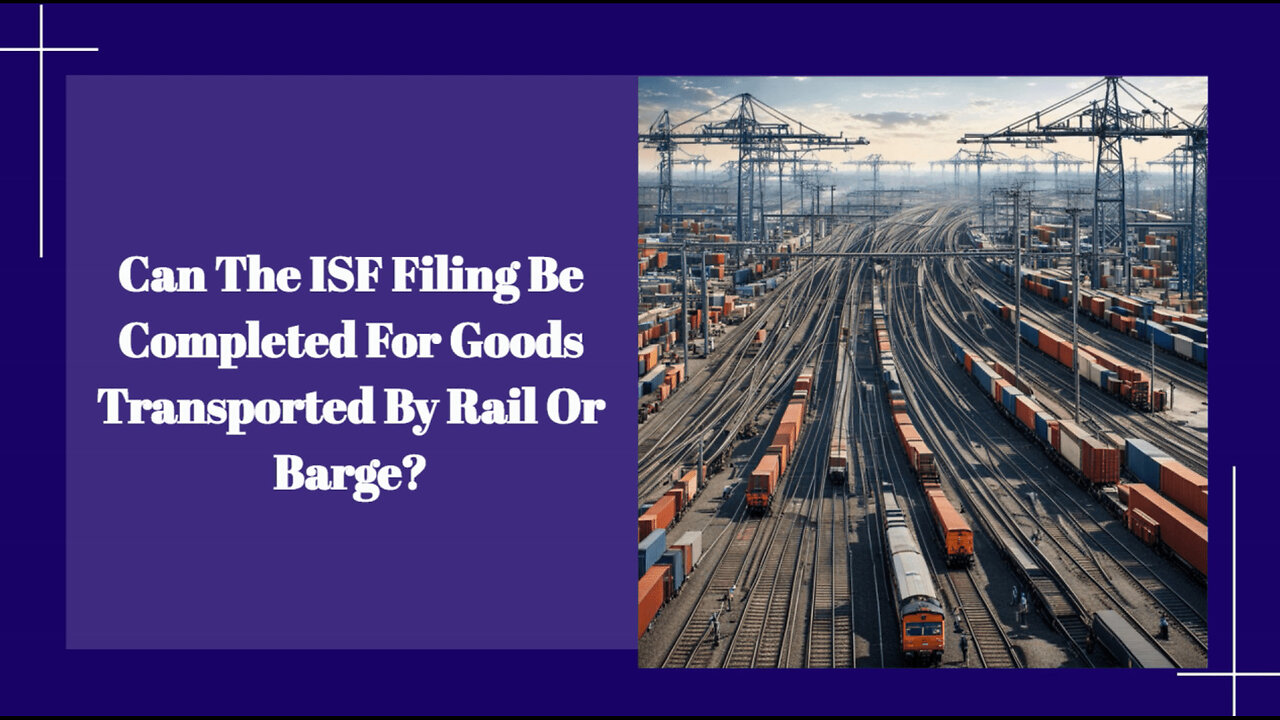Premium Only Content

Customs Clearance for Rail and Barge Shipments: ISF Filing Explained!
ISF Cargo | Phone: 786-865-0459
Email: isf@isfcargo.com | https://isfcargo.com
In today's video, we tackled the question of whether the Importer Security Filing (ISF) can be completed for goods transported by rail or barge. The answer is that the ISF filing is not mandatory for rail or barge shipments according to customs regulations. However, it is important to note that other important documentation and customs procedures still need to be followed.
For rail shipments, the completion of a waybill or bill of lading may be required, while barge shipments may necessitate a barge manifest or container interchange report. Therefore, it is crucial for importers and customs brokers to have a thorough understanding of the specific requirements and regulations associated with each mode of transportation.
In situations where goods are transported using a combination of modes, such as rail and ocean, coordination between all involved parties, including the customs broker or freight forwarder, is necessary to ensure the accurate and timely completion of required documents and filings.
While the ISF filing may not be applicable to rail or barge shipments, compliance with the overall import process and any relevant customs regulations is still essential. This includes verifying the accuracy of shipping documents, tariff classification, determination of duty rates, and adherence to any additional requirements imposed by governing authorities.
It is also important to highlight that a customs bond is still necessary for all shipments entering the United States. Customs bonds serve as a financial guarantee for the payment of duties and taxes and must be in place for rail, barge, or ocean shipments.
To summarize, the ISF filing is not required for goods transported by rail or barge. However, adherence to specific customs requirements and regulations for each mode of transportation is crucial. Compliance with necessary documentation, customs bonds, and other applicable customs procedures is necessary to facilitate a smooth and efficient import process.
Thank you for watching today's video. If you have any further questions or suggestions for future topics, please leave them in the comments section below. Remember to subscribe to our channel and turn on the notification bell for upcoming videos. We appreciate your support and look forward to seeing you in our next video. Take care and happy importing!
#usimportbond #isfcustomsbroker #uscustomsclearing #isfentry
Video Disclaimer Here: This content is for educational use and not associated with any US government body.
00:35 - ISF Filing Overview: The Importer Security Filing (ISF), or 10+2 filing, is required for shipments entering the U.S. by ocean vessel but is not mandatory for goods transported by rail or barge.
00:53 - Documentation Requirements: Despite the absence of ISF filing for rail and barge shipments, other customs procedures and documentation, such as customs bonds and appropriate manifests, must still be adhered to for compliance.
01:12 - Customs Clearance Variations: Customs clearance processes differ for rail and barge shipments compared to ocean shipments, necessitating specific documents like waybills for rail and barge manifests for barge transport.
01:29 - Importance of Compliance: Importers and customs brokers must understand and follow all relevant regulations for each transportation mode, ensuring accurate documentation, customs bonds, and overall compliance with U.S. Customs and Border Protection regulations.
-
 7:03:49
7:03:49
Dr Disrespect
10 hours ago🔴LIVE - DR DISRESPECT - NEW PC VS. DELTA FORCE - MAX SETTINGS
129K26 -
 49:04
49:04
Lights, Camera, Barstool
1 day agoIs The Monkey The Worst Movie Of The Year?? + Amazon Gets Bond
42.8K4 -
 24:19
24:19
Adam Carolla
22 hours agoDiddy’s Legal Drama Escalates, Smuggler Caught Hiding WHAT? + Philly Eagles & The White House #news
49.2K7 -
 10:12
10:12
Mike Rowe
2 days agoClint Hill: What A Man. What A Life. | The Way I Heard It with Mike Rowe
66.7K9 -
 1:31:52
1:31:52
Redacted News
6 hours agoBOMBSHELL! This is war! FBI whistleblowers reveal Epstein files being destroyed? | Redacted News
144K327 -
 48:55
48:55
Candace Show Podcast
6 hours agoSTOP EVERYTHING. They FINALLY Mentioned ME In The Blake Lively Lawsuit! | Candace Ep 152
129K118 -
 1:02:51
1:02:51
In The Litter Box w/ Jewels & Catturd
1 day agoWhere are the Epstein Files? | In the Litter Box w/ Jewels & Catturd – Ep. 750 – 2/26/2025
94.2K85 -
 1:59:06
1:59:06
Revenge of the Cis
8 hours agoLocals Episode 198: Suits
80.2K12 -
 1:38:56
1:38:56
SLS - Street League Skateboarding
1 day agoTop Moments from the Second Half of the 2024 SLS Championship Tour! All The 9’s 🔥
55.1K2 -
 24:22
24:22
Breaking Points
10 hours agoHouse GOP RAMS THROUGH Medicaid Cuts
58.9K37